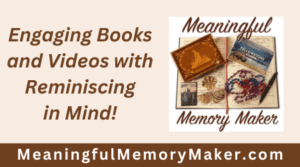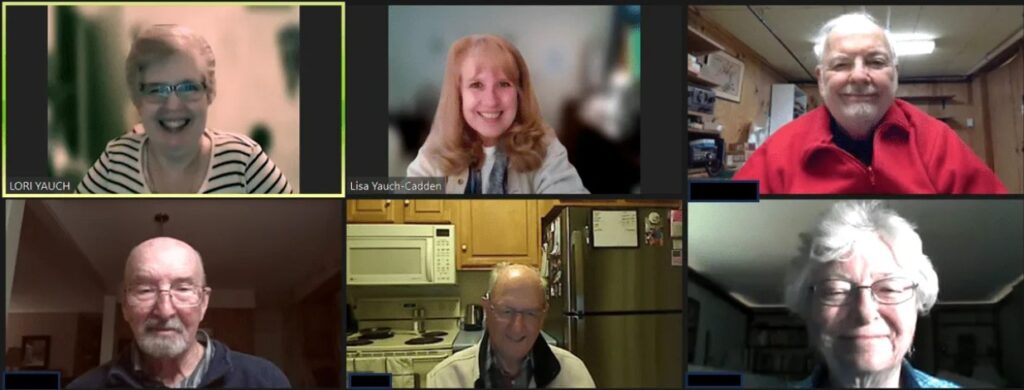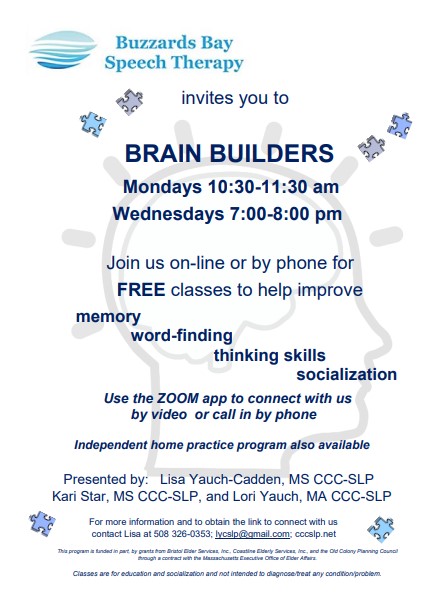The Perfect Spot to Learn: Brain Builders – A Cognitive Wellness Program
 Submitted by Lori K. Yauch
Submitted by Lori K. Yauch
M.A., CCC-SLP
Owner/Manager
Meaningful Memory Maker
The perfect spot to learn. What a great idea!
However, as we age, the thought of learning and remembering new things changes. The first time we forget the location of a set of keys, a new friend’s name, or a necessary appointment, we may think, “Is it fatigue, memory loss, or worse, dementia?”
These questions lead to thoughts of cognitive decline and loss of independence.
When we share these thoughts with a physician, and he administers a memory test as part of an annual physical, we, along with our family and caregivers, nervously await a result.
The response often goes like this:
- “You are in your 80s, and changes are to be expected,” or
- “It looks like Mild Cognitive impairment or dementia.”
We may then proactively ask, “What can be done about it?”
Again, two responses are likely:
- “It’s your age. It’s just a fact of life,” or
- We can begin a regimen of medication to slow the progression of the disease.”
These responses can promote feelings of frustration for initiative-taking individuals and caregivers.
If this question were asked regarding a concern about falling, the doctor might say,
- “Let’s get you some Physical Therapy,” or
- “Sign up for a better balance class.”
In the case of cognitive wellness, however, awareness and access to a “better balance class” for your brain may be limited – until now.
As a proactive caregiver, your first stop may be the Internet. With the input of a few keywords (dementia, caregiving, support, education, cognition), you may find a variety of websites and Facebook pages offering support for you and your loved one.
Online resources include Home Instead, Alzheimer’s Association, Dementia Map, Alzheimer’s Speaks, and Memory Cafe Directory. Upon closer examination, you may find virtual events that provide much-needed emotional support while focusing on spared skills, such as artistic talents. These activities/interactions can provide moments of great joy and allow you and your loved one to find camaraderie with others.
Live events or in-person groups may or may are not available in your area, and if, as a person with dementia or a caregiver, you seek to learn strategies that can help to manage the changes associated with dementing conditions and enhance the cognitive skills you have, you may discover that in-person or virtual classes of this nature are even harder to find.
This is where two speech-language pathologists, Lisa Yauch-Cadden and Kari Star, found themselves in 2015. After providing traditional outpatient speech and language services, they wanted to transition their aging patients to opportunities for continued cognitive-communication wellness. Unfortunately, there were no such opportunities in their area. This led them to create a successful community-based private program called Brain Builders.

Providing The Perfect Spot to Learn: Brain Builders – The Beginning
The flagship program, based in Massachusetts, catered to those persons who were living with neurological injuries such as Aphasia following a stroke, TBI, or Parkinson’s Disease and those on the autism spectrum, many of whom had received outpatient services with Lisa and Kari.
The goal and motto were simple: “Use it or lose it!” By providing cognitive- communication exercises for memory, thinking skills, communication, and word-finding in a social environment that promoted education, camaraderie, and engagement, those living with neurological challenges could feel empowered to take charge of their wellness.
The initial feedback was positive:
“I can’t quite explain how deeply your group touched me today. You are a gift to people with brain injury/disease.”
“I thoroughly enjoy classes with our group. It gets you out and makes you think. I feel very happy when I leave class.”
The Research Behind the Model
Brain Builders initially adapted the Life Participation Approach To Aphasia (LPAA) as a model for their classes. This model states that, at its core, the approach is person-centered and focuses on re-engagement in life.
This approach places the life concerns of those affected by aphasia at the center of all decision-making. A similar statement can be made when considering the person-centered approach to dementia care. This approach also focuses on engagement in activities that are enjoyed and allows for the opportunity to take part in new activities.
Brain Builders now combines these approaches. Activities are often participant-directed and engage attendees, supporting their desires for cognitive and communication growth and social connectedness.
Clinical evidence supports its efficacy.
“Since 2015, we have been collecting outcome data on our Brain Builders Classes for Adults. Quantitative and qualitative results reveal that Brain Builders Classes are effective at decreasing social isolation, encouraging the formation/renewal of friendships and the trying of new things, and improving confidence in communication skills. Additionally, data reflects that the factor most susceptible to change following participation in our classes is a feeling of optimism, born out of camaraderie within the class, gains in self-confidence and self-acceptance, and motivation to improve.” (1)
With Title III funding from Coastline Elderly Services, Inc. and The Massachusetts Executive Office of Elder Affairs, through the Older Americans Act, Lisa and Kari were able to expand the program and bring it to any individual (with or without a neurological diagnosis) concerned about cognitive wellness as they age. Scholarships were made available to any individual 60 years or older who could not afford the private program.
The Pandemic Leads to a New Service Model and Further Expansion of the Program

In March 2020, the public health crisis forced the end of in-person Brain Builders classes and sent them to the Zoom platform. This change in service delivery allowed the program to be accessed by more people in more places. The program currently attracts participants nationwide.
With this expansion, two things changed. The fee-for-service model transitioned to an at-will donation model. With the addition of grant funding from Bristol Elder Services and the Old Colony Planning Council, classes are now free for individuals, with donations gratefully accepted but not required for participation.
The team expanded to include me as a facilitator, allowing evening and theme-based classes to be added. Some recent themes include:
Functional February
All tasks focus on functional activities such as organizing spaces and planning activities.
March Memory Madness
All tasks focus on practicing short-term memory strategies and engaging long-term memory activities, allowing for reminiscing.
Think Spring in April
All tasks focus on engaging thinking skills through problem-solving and reasoning activities.
May is for Math
All activities are focused on calculations.
Healthy Challenges
These theme-based months/activities are designed to allow all members to utilize their strengths while addressing their weaknesses. During a recent May is for Math class, one member said, “It was a challenge. But in a good way.”
While some members might have difficulty in May, they shine in October when the theme is Out and About and focuses more on language than cognition. Themes also allow the facilitators to explore all speech and language service areas (comprehension, expression, attention, recall, executive function, etc.)
Larger classes also allow the facilitators to use the “Break-Out Room” feature of the Zoom app. The larger class is divided into small groups, each addressing the weekly written task or “homework” together. The smaller groups allow each member to contribute to the activity in whatever way they can (speech, gesture, or written communication). Smaller groups also allow members to assist one another in a relaxed, judgment-free social situation.
What Participants are Saying
“Wow. This was fun and challenging. Who thought of this?”
“I haven’t smiled this much in months.”
“This is the happiest group we have attended online.”
“We are one.”
The Brain Builders Difference
Since 2015, Brain Builders has been a different kind of group. It’s not just a class that enhances a set of skills. It’s not just a support group for one specific issue (stroke, Parkinson’s Disease, or Alzheimer’s), although there are elements of support (friendship, camaraderie, the time and space to take as long as you need to say what you mean.) Brain Builders is a group that welcomes everyone, regardless of their challenge, to enter a safe space and address their needs.
In our large and small groups, we mix people with aphasia with people with dementia and people with TBI with people with Parkinson’s Disease. We do this because we have no entrance criteria for the group—just a willingness to enhance your skills. Caregivers, friends, and family members are also welcome. We are here to help all of you on your journey.
We believe in providing cognitive enhancement with compassion.
Would You Like to Join Us? Here’s How!

Classes meet weekly on Mondays from 10:30 a.m. to 11:30 a.m. EST and Wednesdays from 7:00 p.m. to 8:00 p.m. EST via the Zoom App.
They are by Invitation Only.
Email Lisa at lycslp@gmail.com with the Subject Line: I Want to Attend Brain Builders. You will then be placed on our email list and receive a weekly email containing the Zoom link and detailing the “homework” assignment (attached to the email) for that week.
The link can be accessed on a computer, iPad, or iPhone. Can’t join us on the Zoom App? The email contains directions to join us by phone.
Thank you for allowing me to share Brain Builders with you!
I/we want to help individuals and caregivers deal with memory and cognitive-communication changes related to neurological changes, dementing conditions, or normal aging in a socially engaging environment that provides what we believe is the perfect spot to learn.
 Submitted by Lori K. Yauch, M.A., CCC-SLP
Submitted by Lori K. Yauch, M.A., CCC-SLP
Owner/Manager
Meaningful Memory Maker
